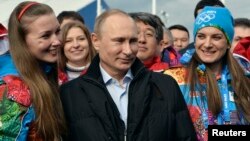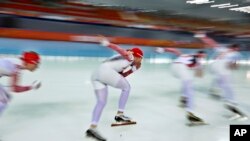When Russia last staged an Olympic Games, much of the world's finest were no shows.
With Sochi, Russia is banking on staging an elaborate turnabout.
Russian President Vladimir Putin has invested heavily in the Winter Olympic Games, which begin Friday in the Russian Black Sea resort.
“Keep in mind the last Olympics in Russia were the 1980 Olympics in Moscow. And these were held a year after Soviet troops invaded Afghanistan. And as a consequence of that, more than 60 nations boycotted the Moscow Olympics,” said Brian Jenkins, an analyst with the RAND Corporation.
“It was a debacle for the Soviet Union, for the Russians. Sochi is their comeback,” he said.
The president of the International Olympic Committee, Thomas Bach, told reporters there that “the Olympic stage is ready for the best winter athletes of the world.”
Russian authorities have spent more than $50 billion on the Winter Olympics making them the most expensive games in history. As a comparison, the 2012 Summer Olympics in London cost $15 billion.
Thomas de Waal, who has written extensively on the North Caucasus, agrees that Putin has staked his personal prestige on the peaceful outcome of these games.
“He is a man who, as we know, has made his whole brand about this, this is a man who has put Russia back on the map. He has made Russia strong again, respected again, a place of prestige,” said de Waal. “He is also a man who loves physical sports and the outdoors. And so he has definitely put an enormous amount into these games and pumped unprecedented amounts of money into these games as well.”
De Waal said if the Sochi games go well and without incident, no one will be more relieved than Putin. But if things go wrong, he is the one who will be blamed.
Security measures tight
A lot of money has been spent on unprecedented security arrangements to prevent terrorist attacks, according to Brian Jenkins, an expert on security and terrorism with the RAND Corporation.
“There are anywhere between 70,000 and 100,000 policemen and military troops deployed around the city. In addition, we hear reports that Russian authorities are going door to door in Sochi looking for suspects - they have some particular individuals they are looking for,” Jenkins explained.
“Vehicles from outside Sochi have been banned in the city. There is a surveillance effort that has been established which will provide the Russian authorities with instant access,” he added, “real time access to all communications taking place in Sochi and, reportedly, even the ability to intervene and alter messages themselves.”
North Caucasus threat
The main threat comes from separatist and jihadi groups in the North Caucasus, especially from Chechnya and Dagestan, located some 500 kilometers from Sochi. Several groups have vowed to disrupt the Winter Olympics.
One such group claimed responsibility for two suicide bombings in late December that killed more than 30 people in Volgograd, the largest city closest to Sochi - some 600 kilometers away.
Bruce Hoffman, an expert on terrorism with Georgetown University, said Sochi has been transformed into a closed city.
“This is probably, without any doubt, the most threatened Olympics since the 1972 Munich Olympics where, of course, the tragedy of the terrorist attack on the Israeli athletes really resulted in the profound changes we see to the Olympics, but also to other huge sporting events in terms of their security.”
Sochi - the only target?
Hoffman said the tight security measures make Sochi a difficult target for terrorists, butu that they don’t need to strike at the games to either disrupt or overshadow the Olympics.
“They may understand that they can’t get close to the games or even the athletes themselves, or even the spectators," Hoffman noted. "But they can and I believe their intention is to make life difficult for the Russians and to create some sort of an incident that takes away from the enjoyment and the sporting spectacular that is the Winter Olympic."
With Sochi, Russia is banking on staging an elaborate turnabout.
Russian President Vladimir Putin has invested heavily in the Winter Olympic Games, which begin Friday in the Russian Black Sea resort.
“Keep in mind the last Olympics in Russia were the 1980 Olympics in Moscow. And these were held a year after Soviet troops invaded Afghanistan. And as a consequence of that, more than 60 nations boycotted the Moscow Olympics,” said Brian Jenkins, an analyst with the RAND Corporation.
“It was a debacle for the Soviet Union, for the Russians. Sochi is their comeback,” he said.
The president of the International Olympic Committee, Thomas Bach, told reporters there that “the Olympic stage is ready for the best winter athletes of the world.”
Russian authorities have spent more than $50 billion on the Winter Olympics making them the most expensive games in history. As a comparison, the 2012 Summer Olympics in London cost $15 billion.
Thomas de Waal, who has written extensively on the North Caucasus, agrees that Putin has staked his personal prestige on the peaceful outcome of these games.
“He is a man who, as we know, has made his whole brand about this, this is a man who has put Russia back on the map. He has made Russia strong again, respected again, a place of prestige,” said de Waal. “He is also a man who loves physical sports and the outdoors. And so he has definitely put an enormous amount into these games and pumped unprecedented amounts of money into these games as well.”
De Waal said if the Sochi games go well and without incident, no one will be more relieved than Putin. But if things go wrong, he is the one who will be blamed.
Security measures tight
A lot of money has been spent on unprecedented security arrangements to prevent terrorist attacks, according to Brian Jenkins, an expert on security and terrorism with the RAND Corporation.
“There are anywhere between 70,000 and 100,000 policemen and military troops deployed around the city. In addition, we hear reports that Russian authorities are going door to door in Sochi looking for suspects - they have some particular individuals they are looking for,” Jenkins explained.
“Vehicles from outside Sochi have been banned in the city. There is a surveillance effort that has been established which will provide the Russian authorities with instant access,” he added, “real time access to all communications taking place in Sochi and, reportedly, even the ability to intervene and alter messages themselves.”
North Caucasus threat
The main threat comes from separatist and jihadi groups in the North Caucasus, especially from Chechnya and Dagestan, located some 500 kilometers from Sochi. Several groups have vowed to disrupt the Winter Olympics.
One such group claimed responsibility for two suicide bombings in late December that killed more than 30 people in Volgograd, the largest city closest to Sochi - some 600 kilometers away.
Bruce Hoffman, an expert on terrorism with Georgetown University, said Sochi has been transformed into a closed city.
“This is probably, without any doubt, the most threatened Olympics since the 1972 Munich Olympics where, of course, the tragedy of the terrorist attack on the Israeli athletes really resulted in the profound changes we see to the Olympics, but also to other huge sporting events in terms of their security.”
Sochi - the only target?
Hoffman said the tight security measures make Sochi a difficult target for terrorists, butu that they don’t need to strike at the games to either disrupt or overshadow the Olympics.
“They may understand that they can’t get close to the games or even the athletes themselves, or even the spectators," Hoffman noted. "But they can and I believe their intention is to make life difficult for the Russians and to create some sort of an incident that takes away from the enjoyment and the sporting spectacular that is the Winter Olympic."






